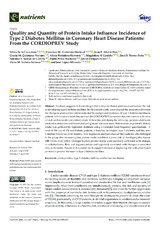Quality and Quantity of Protein Intake Influence Incidence of Type 2 Diabetes Mellitus in Coronary Heart Disease Patients: From the CORDIOPREV Study
Autor
Cruz‐Ares, Silvia de la
Gutiérrez Mariscal, Francisco Miguel
Alcalá Díaz, Juan Francisco
Quintana-Navarro, Gracia M.
Podadera-Herreros, Alicia
Cardelo, Magdalena P.
Torres‑Peña, J.D.
Arenas de Larriva, Antonio P.
Pérez-Martínez, Pablo
Delgado-Lista, Javier
Yubero-Serrano, Elena M.
López-Miranda, José
Editor
MDPIFecha
2021Materia
Plant proteinsType 2 diabetes mellitus
Cardiovascular disease
METS:
Mostrar el registro METSPREMIS:
Mostrar el registro PREMISMetadatos
Mostrar el registro completo del ítemResumen
Evidence suggests that enriching a diet with plant-based proteins could reduce the risk of developing type 2 diabetes mellitus. In the present work, we evaluated the association between the change in plant protein intake (adjusted by energy) and incidence of type 2 diabetes mellitus in patients with coronary heart disease from the CORDIOPREV (coronary diet intervention with olive oil and cardiovascular prevention) study. At baseline and during the follow-up, patients underwent medical examination and blood and oral glucose tolerance tests. Information on patient’s dietary intake was gathered by registered dietitians using a validated food frequency questionnaire. A total of 106 out of 436 nondiabetic patients at baseline developed type 2 diabetes mellitus after a median follow-up of 60 months. Cox regression analyses showed that patients who belonged to the group that increased plant protein intake exhibited a lower risk of developing the disease (HR = 0.64, (0.43–0.96)). Changes in plant protein intake were positively correlated with changes in carbohydrates, fibre, and legumes intake and negatively correlated with changes in saturated fatty acids intake. Results of the present study support the need of improving diet with plant-based proteins to prevent the onset of type 2 diabetes mellitus.

